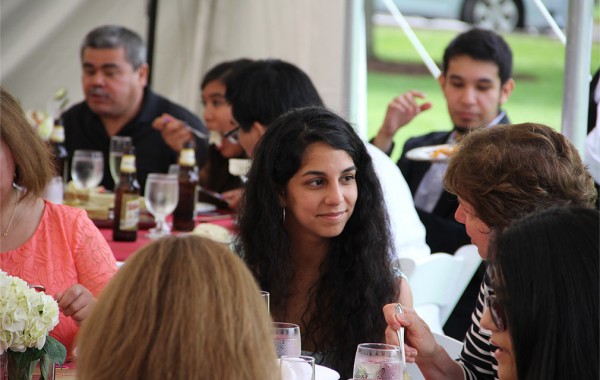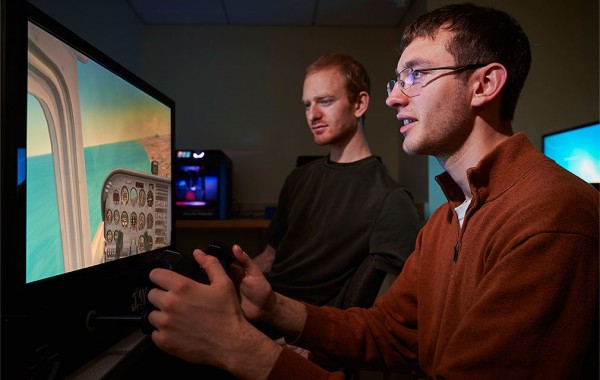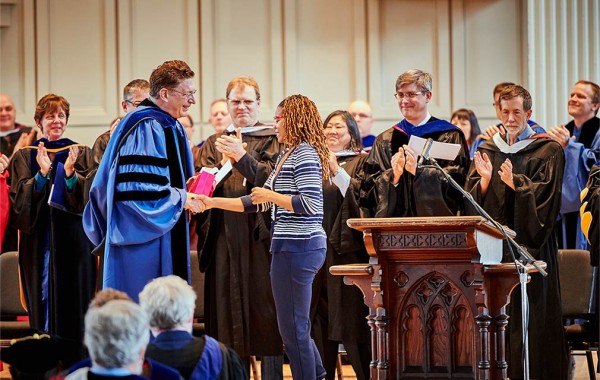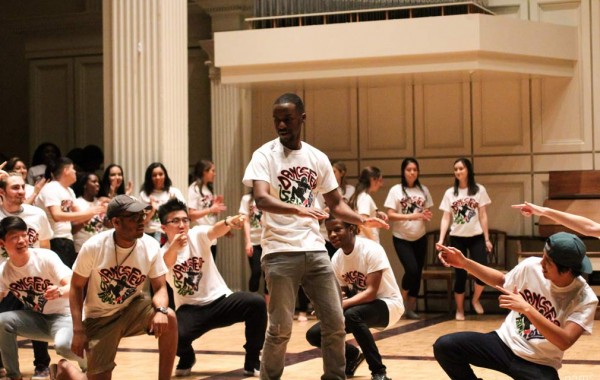A degree of determination
Change can happen, but it requires a constant commitment, Eddie Glaude Jr. told the graduating class during his commencement address on May 17. “Those commitments don’t work like a tweet or a post on Instagram or comments on Yik Yak. They ought to animate the spirit of a life lived over time,” said Glaude, who is a Princeton University religion and African American studies professor.
To underline his point, Glaude commended students for their sit-in last fall, but reminded them that a similar demonstration happened 47 years ago. “It is your inexhaustible voice, to paraphrase William Faulkner, your spirit capable of compassion and sacrifice and endurance that is the only possible salvation we have now.”
The previous day, at the Baccalaureate service, Rev. Gay Clark Jennings ’74 also told students that they were “well equipped to think creatively and critically about how you will make an impact in the public square.” Jennings is the first ordained woman to be elected president of the Episcopal Church House of Deputies. She is known for strengthening the church’s commitment to vulnerable children, immigrants, and lesbian, gay, bisexual, and transgender people.
Jennings and Glaude were among those who received honorary degrees at commencement. The others included emeritus Colgate computer science professors Elizabeth and Thomas Brackett; former Washington University Provost Edward Macias ’66; Harvard University sciences professor Naomi Oreskes; and outgoing President Jeffrey Herbst.
See more of the 194th commencement weekend at Colgate.edu/commencement. (Top photo by Andrew M. Daddio)
First-generation celebration

First-generation college students in the Class of 2015 were honored at a luncheon during commencement weekend.
What was intended to be a luncheon to honor first-generation students graduating with the Class of 2015 turned into an event where the students acknowledged their loved ones for supporting their journeys.
The moving tribute took shape at the semiformal event on the Merrill House lawn as students took to the microphone and spoke directly to their families in whatever language was most comfortable for them — Spanish, English, Russian, or Chinese.
One student, through tears, thanked her mother for adopting her, and making her the star of their family, while another talked about the sacrifices her parents made after coming to America as immigrants in search of a better life for their children.
Admission dean Gary Ross ’77 read a portion of the original application essay submitted by a student from California who graduated with honors as a double major in Spanish and sociology and anthropology. “Even while being the first person in my family to go to college, I know that I will be able to break even more borders with that degree in my hands,” Ross read. “I know now that anything is possible as long as we put our heart and soul into it.”
With admiration for the students, Ross said, “Most, if not all of you, knew your journey through college would not be easy; however, you considered academically demanding colleges and universities like Colgate … because of the fact that you knew it would be hard. You, too, were ready to pour your heart and soul into the journey.”
Farewell, Adam and Eve
The mute swans that have graced Taylor Lake since 1929 will no longer make their home at Colgate. The announcement that Adam and Eve were moving on came after the New York State Department of Environmental Conservation (DEC) published new draft regulations governing their maintenance and care.
The DEC regulations, proposed in March, will require that any person or organization owning mute swans hold a license for nonnative species; the birds were brought to North America from Europe in the 19th century to nest on New World estates. As well, swans must either have their wings clipped or be confined to an enclosed space to ensure that they are unable to escape into the wild. In addition, the birds must be tagged and surgically sterilized. The DEC implemented its rules after conducting research into the impact of mute swans on the environment and allowing for a public comment period earlier this year.
These requirements would have had a substantial impact on the quality of life for Adam and Eve. Therefore, the owner from whom the university had leased the swans decided to sell his stock to swan owners in Ohio, and Colgate will not seek to purchase or lease new swans.
“When mute swans became a part of the Colgate tradition in 1929, they were little more than a curiosity in America,” said biology department chair Tim McCay. “DEC research now indicates that the population is capable of reducing the quality of native environments.”
John Pumilio, director of sustainability at Colgate and ornithology instructor for the National Audubon Society, believes the new policies are in the best interest of the swans and the environment. “Mute swans consume up to eight pounds of aquatic vegetation per day, often uprooting more plants than they can consume,” he said. The swans also threaten native ducks, grebes, and mergansers that try to nest on and around Taylor Lake.
With decades of alumni holding fond memories of our swans swimming gracefully across the lake, Adam and Eve will live on in the hearts of the Colgate community.
Brookings calls Colgate #2 in value
In a study of four-year universities, Colgate was ranked second for “value added” with respect to mid-career earnings, according to the Brookings Metropolitan Policy Program.
“Beyond College Rankings” is the first to compare a broad array of colleges on economic outcomes for graduates, using government and private data sources including LinkedIn and PayScale. It also factors in seven quality metrics: curriculum value, percentage graduating in a STEM field, alumni skills, graduation rate, retention rate, aid per student, and instructional staff.
“It’s not the majors that are driving their student success, and it’s not the skills they list on résumés,” said lead author and Brookings fellow Jonathan Rothwell. “It may be they have access to great teachers; it may be that their alumni networks are strong.”
According to Brookings, the survey improves on conventional rankings in several ways: it includes a much larger number of schools; focuses on factors that best predict measurable economic outcomes; and attempts to isolate the effect colleges themselves have on those outcomes, above and beyond what students’ backgrounds would predict.
Reaching new heights

Colin Shipley ’15 (right) takes the controls of the new Redbird Jay flight simulator purchased by the Aviation Club. (Photo by Andrew M. Daddio)
Navigating the skies of Dubai. from takeoff to landing, is no easy task. But members of Colgate’s Aviation Club have been getting some practice thanks to a new flight simulator that lets users fly any plane in any weather condition in any city in the world.
The new system, kept in Case-Geyer Library, is accessible to members of the community upon request.
“The flight procedures and checklists are pretty much the same [as with a real plane] prior to takeoff and landing,” said club president Colin Shipley ’15. “We’re able to accustom students to small-aircraft controls and basic flight procedures before they step into an actual cockpit through our Discovery Flights program.”
Colgate’s Aviation Club has existed for approximately a decade, but Shipley began expanding it in spring 2012 as a Thought Into Action (TIA) project. “With the input of various mentors and student entrepreneurs in the program, I developed a strategy to market the club to the student body and interested alumni,” said Shipley. “Successful projects thus far include the introduction of Soaring Discovery Flights with the Iroquois Soaring Association and the purchase of radio-controlled airplanes and helicopters.”
The Aviation Club’s gift fund was used to purchase the simulator, with half of the funds given by Shipley’s TIA mentor Jason Griswold ’97. “Another alumnus [Per Sekse ’78] provided a professional headset for the simulator,” Shipley said.
Every semester, approximately 60 students can go up in real planes through the Aviation Club’s Discovery Flights program at Hamilton Municipal Airport. From the ground, they can learn how to fly the club’s radio-controlled (RC) blimp and other aircrafts.
“[The simulator] can help familiarize students with the particular type of aircraft they may want to fly in the future, or [help them prepare for] the Discovery Flights,” said Kevin Lynch, Colgate’s chief information officer and the club’s faculty adviser.
“It’s not approved for actual flight training, but it is a useful tool for students,” explained Lynch, who builds and flies model aircrafts as a hobby. “Plus, it’s just plain fun.”
Shipley, who graduated in May, plans to pursue his private pilot’s license. “From the limited flying I’ve done in small aircraft, the [simulator’s] controls and responsiveness to the pilot’s inputs are well done and quite similar to actual flight,” he said. “However, there’s only so much of a realistic experience you can have before looking left or right and realizing you’re still in Case Library.”
— Natalie Sportelli ’15
Downtown incubator abuzz
Being selected for the Colgate Entrepreneurs Fund (eFund) can change everything for a fledgling start-up — especially when combined with incubator space and direct access to Thought Into Action (TIA) alumni-mentor support for an entire summer in Hamilton.
The $15,000 award that comes with selection opens doors for these new ventures. Some hire product engineers, web developers, or advertising buys; some use the capital to allow for full-time work on an idea in lieu of a day job.
The eFund, originally seeded by Colgate parent Dan Rosensweig, is now funded by numerous Colgate parents and alumni. Now in its third year, the eFund has awarded a total of $255,000 to 17 ventures since 2012.
The mentoring and expertise that the entrepreneurs in the incubator space receive are just as valuable as the funding, they’ve said.
“For most of the eFund entrepreneurs, this is the first time they’ve had the opportunity to spend one hundred percent of their time, focus, and creativity on their ventures,” explained TIA co-founder Wills Hapworth ’07. “They get to stop moonlighting on their idea, and make a hard push at creating success, with capital and mentorship to accelerate their growth … and we’ve seen it work for many of the teams.”
This year’s eFund winners include: Adam Buys ’17 and Zy Mazza (Echo, a mobile app that uses geolocational data on your phone to highlight social events nearby); David Myers ’14 and Alex Drakos ’16 (Brainstorm Technologies, which aims to create a headset that boosts concentration through gentle electrical brain stimulation); Alex Relph ’09 and Sam Breslin ’09, former Colgate football players (whose Platform Athletics is a web-based training platform designed for high school coaches in the development of student athletes); Amanda Brown ’15 (Children and Youth First USA, a branch of a Nepalese nonprofit that supports youth and women in Nepal), Jake Danehy ’17 and Caroline Danehy ’19 (Fair Harbor Clothing, which makes swimsuits from recycled bottles); and Raffi Khatchadorian ’17 and Keshav Garg ’15 (Indify, which helps record labels discover talent).
 Kori Strother ’15, an Africana and Latin American studies major from Saint Louis, Mo., received Colgate’s highest student honor, the 1819 Award. Strother helped lead the peaceful 100-hour campus demonstration in the fall of 2014, during which students called for a campus united against racial intolerance. In January, she gave a moving keynote address during Martin Luther King Jr. Week, encouraging the Colgate community to unabashedly confront issues of race. A 2013 summer fellow with the Colgate Upstate Institute and a 2014 Lampert Institute fellow, Strother captained Colgate’s Division I women’s track team, and was co-vice president of the Student-Athlete Advisory Committee. A Dean’s Award winner and member of the Raider Academic Honor roll, Strother also worked as a community leader in Residential Life, and was an intern in the Office of LGBTQ Life. (Photo by Andrew M. Daddio)
Kori Strother ’15, an Africana and Latin American studies major from Saint Louis, Mo., received Colgate’s highest student honor, the 1819 Award. Strother helped lead the peaceful 100-hour campus demonstration in the fall of 2014, during which students called for a campus united against racial intolerance. In January, she gave a moving keynote address during Martin Luther King Jr. Week, encouraging the Colgate community to unabashedly confront issues of race. A 2013 summer fellow with the Colgate Upstate Institute and a 2014 Lampert Institute fellow, Strother captained Colgate’s Division I women’s track team, and was co-vice president of the Student-Athlete Advisory Committee. A Dean’s Award winner and member of the Raider Academic Honor roll, Strother also worked as a community leader in Residential Life, and was an intern in the Office of LGBTQ Life. (Photo by Andrew M. Daddio)
Crowd-funding kindness
The Konosioni Senior Honor Society has helped develop a new way to assist local nonprofits. Madison County Gives, a crowd-funding website, provides a platform for raising funds to support those organizations’ invaluable services.
Each fall, Konosioni accepts funding proposals and allocates the proceeds from its annual charity auction to selected organizations. But sometimes, the auction proceeds cannot cover the full amount each organization requested. Now, with Madison County Gives, anyone can donate online to help the organizations raise the remainder. The website was conceived through a joint venture between Konosioni and Julie Dudrick of Colgate’s Upstate Institute.
The nearly $25,000 raised at this year’s auction will be allocated through the site, along with other funds raised from the public. The eight organizations featured this year include Wanderers’ Rest Humane Association, Chenango Nursery School, and the Mary Rose Clinic.
Other campus groups also donated to Madison County Gives as part of their philanthropy efforts, which included a collaborative a cappella concert with the Colgate Activities Board that raised $500; Brothers Charity Week, which collected $2,500; and a Colgate Olympics event, hosted by the Student-Athlete Advisory Committee, which also raised approximately $500.
Earlier in the spring, Konosioni held a brown bag luncheon and invited representatives from this year’s funded organizations to share their missions and talk about how they serve Madison County; they were also invited to this year’s charity auction.
— Natalie Sportelli ’15
Village Green

Get your noodle bowl “As You Like It” — a nod to longtime Colgate English professor Margaret Maurer — at the new N13 restaurant opened by Scott Williams ’80 in downtown Hamilton. Other Asian delicacies joining this mix-and-match menu item include tamarind rice cakes and pork belly dumplings. Williams credits his daughters, Katie ’15 and Lacey ’16, with the idea for the noodle shop, located at 3 Lebanon Street next to the Hamilton Movie Theater. N13 opened its doors at 1300 hours on April 10, with three of Colgate’s a cappella groups performing a selection of songs at the grand opening. When he’s not at N13, Williams operates a Washington, D.C.–based communications and PR firm. His past restaurant experience includes helping launch two popular brewpubs in the U.S. capital.
The Broad Street Gallery marked the addition of new artists, artwork, and a gift shop with a grand re-opening celebration on April 11. Four new artists and artisans have helped fill the gallery with artwork. At the gift shop, visitors can buy affordable prints, ceramics, cards, jewelry, and more.

The Hamilton Public Library hosted a Caldecott-Newbery Tea on April 18. While a handful of book lovers gave short presentations on the 2015 Caldecott and Newbery Award winners, attendees sipped tea and flipped through the selections. “I decided I’d rather be more inclusive with our audience, aiming the event for any teens and adults who have an interest in these books,” explained Hilary Virgil, the library’s director.
The Colgate Bookstore joined in national Independent Bookstore Day on May 2 with stories, crafts, and snacks for kids. Later, teens and adults proved their knowledge of books with Literary Trivial Pursuit.
— Meredith Dowling ’17
Shirt Tales

From tap to Tahitian, the students sporting Dancefest shirts know all the right steps. This semester’s T-shirt was designed by Dancefest veteran Jenna Bryfonski ’15 and, here, is worn by the WolfPack.
“Shut Up and Dance,” the opening number’s song, was also the theme of the event. More than 250 students performed in 16 dance groups for a live audience of 800 and an online audience of nearly 8,000 Livestream viewers.
Dancefest has won the Center for Leadership and Student Involvement’s awards for Event of the Year and Best Colgate Tradition and it continues to be a highly attended event on campus.
“It’s incredible to see the Colgate community come together with such positivity and energy,” said Danielle Iwata ’15, a member of FUSE Dance Company and the leader of the Colgate Dance Initiative.
“It’s a reminder that although we all come from different backgrounds and our campus isn’t perfect, we can still celebrate the passion and dedication of the student body,” said Iwata. “It’s a testament to the Colgate spirit.”
Go Figure – Welcoming the Class of 2019
781 students
29.1% multicultural students
7% international students
56 children and grandchildren of alumni
200 years since Colgate’s very first class arrived
7 pre-orientation programs planned for them
49 student Links ready to mentor and guide
122 student workers will help them move in
5 a cappella groups practicing to serenade on move-in day
6 first-year residence halls
246 student clubs and organizations registered for incoming students to get involved
4 years of friendships, memories, and learning lie ahead
— Emma Loftus ’16







